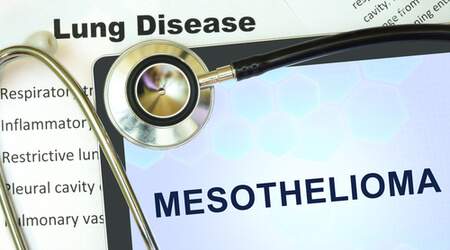
Mesothelioma is cancer of the mesothelium – a protective membrane made of mesothelial cells that form sacs of fluid around human organs. These sacs allow organs to properly move and function. Mesothelioma cancer causes mesothelium cells to divide abnormally and uncontrollably.
The malignant cells can metastasize and spread to the organ they are protecting and to other organs as well. Mesothelioma cancers can take up to 50 years to be diagnosed.
The cancer is often advanced when diagnosed and many patients die within one to two years of diagnosis.
Mesothelioma generally affects these three parts of the human body:
- Lungs (pleural mesothelioma)
- Abdomen (peritoneal mesothelioma)
- Heart (pericardial mesothelioma)
Pleural mesothelioma. Pleural mesothelioma is a cancer that affects the lungs. It starts in the pleura, the lining around the chest cavity, and accounts for 75 percent of all mesothelioma cases. The most common symptoms of pleural mesothelioma include:
- Shortness of breath
- Persistent dry cough
- Persistent chest pain
- Night sweats/fever
- Fatigue
- Difficulty swallowing
Traditional treatments for pleural mesothelioma include radiation and chemotherapy. Although these treatments can remove or kill cancerous cells, they may also kill healthy cells in the process. Surgery to remove all or part of the affected lung can also be an option; however, this can be dangerous and seriously affect a patient’s overall health and future quality of life.
Peritoneal Mesothelioma. Peritoneal mesothelioma is cancer of the abdomen. It starts in the peritoneum, the lining around the abdomen, and accounts for 10 to 20 percent of all mesothelioma cases. The most common symptoms of peritoneal mesothelioma include:
- Fatigue
- Constipation or diarrhea
- Abdominal pain and swelling
- Nausea/vomiting
- Weight loss
Traditional treatments for peritoneal mesothelioma also include radiation, chemotherapy and surgery to remove the cancerous tissue in the abdomen or gastrointestinal tract. However, treatment can be difficult as peritoneal mesothelioma tends to metastasize more quickly than other types of mesothelioma. In many cases, treatments are palliative and simply focus on the cancer’s symptoms – they are not a cure.
Pericardial Mesothelioma. Pericardial mesothelioma is cancer of the heart. It starts in the pericardium, the exterior lining around the heart, and accounts for about 1 percent of all mesothelioma cases. The most common symptoms of pericardial mesothelioma include:
- Chest pain
- Coughing
- Difficulty breathing
- Night sweats/fever
- Irregular heartbeat
- Fatigue
Traditional treatments for pericardial mesothelioma also include radiation and chemotherapy; however, attempting surgery to remove the cancer is risky due to its extreme proximity to the heart. As with other forms of mesothelioma, treatment for pericardial mesothelioma is often palliative in nature and merely focuses on symptoms – not a cure.
If you or a family member is suffering from mesothelioma, call Joye Law Firm. You can reach us at (888) 324-3100 or fill out a free online consultation form and talk to a personal injury lawyer in Charleston, Myrtle Beach or Clinton today.



























